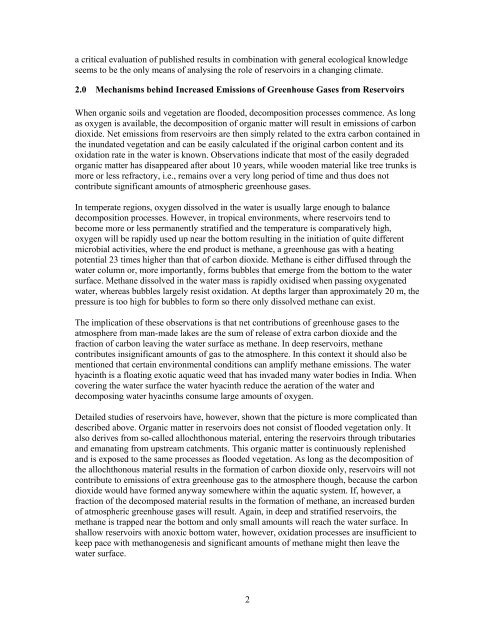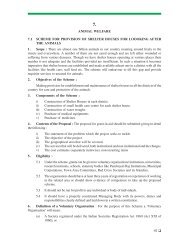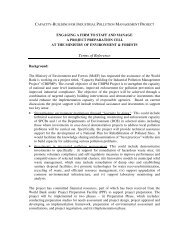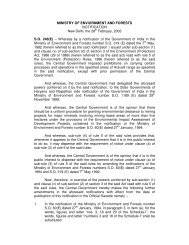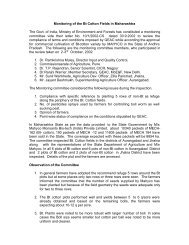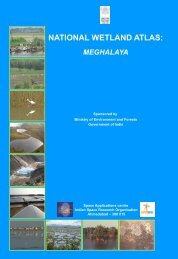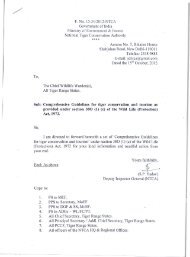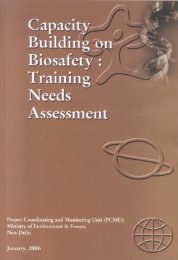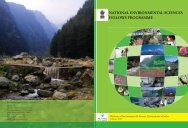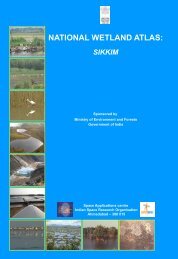REVIEW OF GREENHOUSE GAS EMISSIONS FROM THE ...
REVIEW OF GREENHOUSE GAS EMISSIONS FROM THE ...
REVIEW OF GREENHOUSE GAS EMISSIONS FROM THE ...
Create successful ePaper yourself
Turn your PDF publications into a flip-book with our unique Google optimized e-Paper software.
a critical evaluation of published results in combination with general ecological knowledgeseems to be the only means of analysing the role of reservoirs in a changing climate.2.0 Mechanisms behind Increased Emissions of Greenhouse Gases from ReservoirsWhen organic soils and vegetation are flooded, decomposition processes commence. As longas oxygen is available, the decomposition of organic matter will result in emissions of carbondioxide. Net emissions from reservoirs are then simply related to the extra carbon contained inthe inundated vegetation and can be easily calculated if the original carbon content and itsoxidation rate in the water is known. Observations indicate that most of the easily degradedorganic matter has disappeared after about 10 years, while wooden material like tree trunks ismore or less refractory, i.e., remains over a very long period of time and thus does notcontribute significant amounts of atmospheric greenhouse gases.In temperate regions, oxygen dissolved in the water is usually large enough to balancedecomposition processes. However, in tropical environments, where reservoirs tend tobecome more or less permanently stratified and the temperature is comparatively high,oxygen will be rapidly used up near the bottom resulting in the initiation of quite differentmicrobial activities, where the end product is methane, a greenhouse gas with a heatingpotential 23 times higher than that of carbon dioxide. Methane is either diffused through thewater column or, more importantly, forms bubbles that emerge from the bottom to the watersurface. Methane dissolved in the water mass is rapidly oxidised when passing oxygenatedwater, whereas bubbles largely resist oxidation. At depths larger than approximately 20 m, thepressure is too high for bubbles to form so there only dissolved methane can exist.The implication of these observations is that net contributions of greenhouse gases to theatmosphere from man-made lakes are the sum of release of extra carbon dioxide and thefraction of carbon leaving the water surface as methane. In deep reservoirs, methanecontributes insignificant amounts of gas to the atmosphere. In this context it should also bementioned that certain environmental conditions can amplify methane emissions. The waterhyacinth is a floating exotic aquatic weed that has invaded many water bodies in India. Whencovering the water surface the water hyacinth reduce the aeration of the water anddecomposing water hyacinths consume large amounts of oxygen.Detailed studies of reservoirs have, however, shown that the picture is more complicated thandescribed above. Organic matter in reservoirs does not consist of flooded vegetation only. Italso derives from so-called allochthonous material, entering the reservoirs through tributariesand emanating from upstream catchments. This organic matter is continuously replenishedand is exposed to the same processes as flooded vegetation. As long as the decomposition ofthe allochthonous material results in the formation of carbon dioxide only, reservoirs will notcontribute to emissions of extra greenhouse gas to the atmosphere though, because the carbondioxide would have formed anyway somewhere within the aquatic system. If, however, afraction of the decomposed material results in the formation of methane, an increased burdenof atmospheric greenhouse gases will result. Again, in deep and stratified reservoirs, themethane is trapped near the bottom and only small amounts will reach the water surface. Inshallow reservoirs with anoxic bottom water, however, oxidation processes are insufficient tokeep pace with methanogenesis and significant amounts of methane might then leave thewater surface.2


